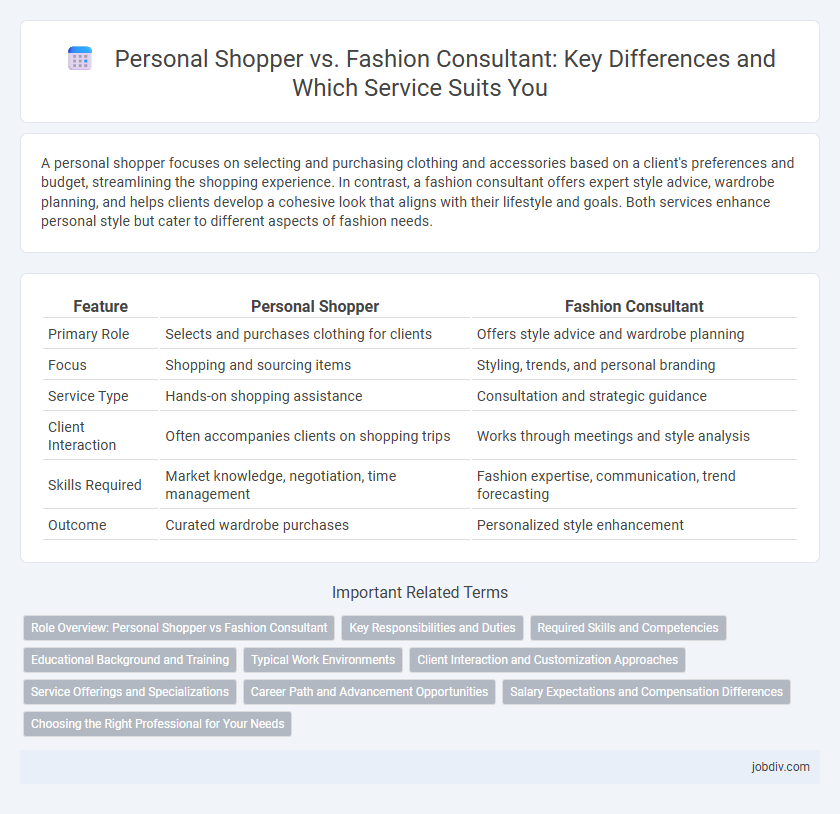A personal shopper focuses on selecting and purchasing clothing and accessories based on a client's preferences and budget, streamlining the shopping experience. In contrast, a fashion consultant offers expert style advice, wardrobe planning, and helps clients develop a cohesive look that aligns with their lifestyle and goals. Both services enhance personal style but cater to different aspects of fashion needs.
Table of Comparison
| Feature | Personal Shopper | Fashion Consultant |
|---|---|---|
| Primary Role | Selects and purchases clothing for clients | Offers style advice and wardrobe planning |
| Focus | Shopping and sourcing items | Styling, trends, and personal branding |
| Service Type | Hands-on shopping assistance | Consultation and strategic guidance |
| Client Interaction | Often accompanies clients on shopping trips | Works through meetings and style analysis |
| Skills Required | Market knowledge, negotiation, time management | Fashion expertise, communication, trend forecasting |
| Outcome | Curated wardrobe purchases | Personalized style enhancement |
Role Overview: Personal Shopper vs Fashion Consultant
A Personal Shopper specializes in selecting and purchasing clothing or accessories tailored to a client's specific tastes and needs, often handling shopping logistics to save time. A Fashion Consultant provides expert advice on style, trends, and wardrobe coordination, aiming to enhance the client's overall appearance and confidence. Both roles require a strong understanding of fashion, but Personal Shoppers focus more on procurement while Fashion Consultants emphasize styling strategy.
Key Responsibilities and Duties
A Personal Shopper specializes in selecting and purchasing clothing and accessories tailored to an individual's style and preferences, often assisting with wardrobe updates and event-specific outfits. A Fashion Consultant provides expert advice on styling, trend forecasting, and outfit coordination to enhance a client's overall appearance and confidence. Both roles require strong knowledge of fashion brands, personal taste assessment, and exceptional customer service skills.
Required Skills and Competencies
A Personal Shopper requires strong knowledge of current fashion trends, excellent communication skills, and the ability to understand client preferences quickly to curate personalized wardrobes efficiently. A Fashion Consultant combines these skills with strategic styling expertise, trend forecasting, and the ability to provide comprehensive advice on wardrobe planning, body types, and brand selection. Both roles demand creativity, attention to detail, and a deep understanding of fashion aesthetics, but a Fashion Consultant typically requires more advanced industry knowledge and analytical skills.
Educational Background and Training
Personal shoppers often rely on practical experience and on-the-job training to understand client preferences and market trends, whereas fashion consultants typically possess formal education in fashion design, merchandising, or marketing. Certified courses in color theory, fabric knowledge, and styling techniques enhance the expertise of fashion consultants, aligning their skills with industry standards. Both roles benefit from continuous learning through workshops and fashion shows to stay updated on evolving styles and consumer behavior.
Typical Work Environments
Personal shoppers typically work in retail stores, boutiques, and department stores, assisting clients with product selection and purchases. Fashion consultants often operate in a broader range of settings, including wardrobe styling studios, fashion agencies, and private client homes, providing personalized fashion advice and image consulting. Both professionals may also offer virtual services, adapting to the growing trend of online shopping and remote consultations.
Client Interaction and Customization Approaches
Personal shoppers prioritize convenience by selecting ready-to-purchase items tailored to clients' immediate needs and preferences, emphasizing efficient and time-saving interactions. Fashion consultants offer in-depth style assessments, utilizing personalized consultations to craft long-term wardrobe strategies that reflect clients' unique lifestyles and body types. Both roles customize their services, but personal shoppers focus on transactional efficiency while fashion consultants emphasize holistic style transformation.
Service Offerings and Specializations
Personal shoppers specialize in selecting and purchasing clothing and accessories tailored to clients' tastes and occasions, often providing hands-on assistance during shopping trips. Fashion consultants offer broader style guidance, including wardrobe planning, trend analysis, and personal branding to enhance overall image. Both services prioritize personalization, but fashion consultants typically focus more on strategic style development while personal shoppers emphasize convenience and curated selections.
Career Path and Advancement Opportunities
A Personal Shopper primarily focuses on selecting and purchasing clothing tailored to clients' tastes, making it an entry-level role with opportunities to deepen product knowledge and client relationships. In contrast, a Fashion Consultant offers strategic style advice and trend insights, often requiring broader fashion expertise and experience that can lead to senior advisory roles or brand consultancy positions. Both career paths provide advancement opportunities through networking, specialization, or transitioning into related fashion industry roles like styling or merchandising.
Salary Expectations and Compensation Differences
Personal shoppers typically earn between $30,000 and $50,000 annually, with compensation heavily reliant on commissions and client tips, while fashion consultants often command higher salaries ranging from $50,000 to $80,000 due to their specialized expertise and strategic role in brand development. In addition to base salary, fashion consultants may receive bonuses, profit sharing, and benefits, reflecting their contribution to marketing and merchandising strategies. Salary expectations vary by location, experience, and employer, with fashion consultants generally enjoying more stable and lucrative compensation packages compared to personal shoppers.
Choosing the Right Professional for Your Needs
Choosing between a personal shopper and a fashion consultant depends on your specific style goals and shopping preferences. A personal shopper specializes in selecting and purchasing clothing that fits your lifestyle and budget, while a fashion consultant offers expert advice on styling, wardrobe planning, and trend direction. Understanding whether you need hands-on shopping assistance or strategic fashion guidance helps ensure you select the professional best suited to enhance your personal style.
Personal Shopper vs Fashion Consultant Infographic

 jobdiv.com
jobdiv.com